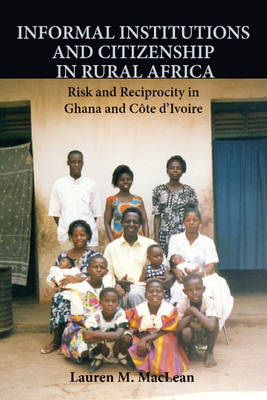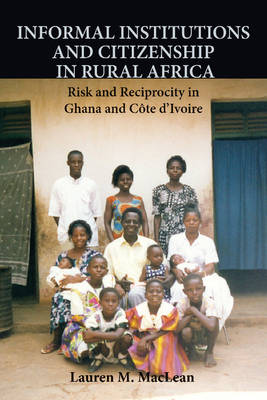
- Afhalen na 1 uur in een winkel met voorraad
- Gratis thuislevering in België vanaf € 30
- Ruim aanbod met 7 miljoen producten
- Afhalen na 1 uur in een winkel met voorraad
- Gratis thuislevering in België vanaf € 30
- Ruim aanbod met 7 miljoen producten
Zoeken
Informal Institutions and Citizenship in Rural Africa
Risk and Reciprocity in Ghana and Cote d'Ivoire
Lauren M MacLean
€ 64,95
+ 129 punten
Uitvoering
Omschrijving
This book challenges previous assumptions about institutions, social capital, and the nature of the African state by investigating the history of political and economic change in villages on either side of the Ghana-Cote d'Ivoire border. Prior to European colonial rule, these Akan villages had very similar political and cultural institutions. By the late 1990s, however, Lauren M. MacLean found puzzling differences in the informal institutions of reciprocity and indigenous notions of citizenship. Drawing on extensive village-based fieldwork and archival research, MacLean argues that divergent histories of state formation not only shape how villagers help each other but also influence how local groups and communities define citizenship and then choose to engage with the state on an everyday basis. She examines the historical construction of the state role in mediating risk at the local level across three policy areas: political administration, social service delivery, and agriculture, highlighting the importance of the colonial and post-colonial state in transforming informal institutions.
Specificaties
Betrokkenen
- Auteur(s):
- Uitgeverij:
Inhoud
- Aantal bladzijden:
- 314
- Taal:
- Engels
- Reeks:
Eigenschappen
- Productcode (EAN):
- 9781107617957
- Verschijningsdatum:
- 2/01/2014
- Uitvoering:
- Paperback
- Formaat:
- Trade paperback (VS)
- Afmetingen:
- 156 mm x 234 mm
- Gewicht:
- 485 g

Alleen bij Standaard Boekhandel
+ 129 punten op je klantenkaart van Standaard Boekhandel
Beoordelingen
We publiceren alleen reviews die voldoen aan de voorwaarden voor reviews. Bekijk onze voorwaarden voor reviews.







